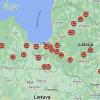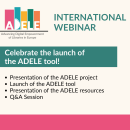ADELE: Discover 100 Case studies of digital innovation in European public libraries
Digital technologies have profoundly changed our personal, professional and educational lives. The changes in the educational landscape due to digital progress are far reaching and the adult education sector is now exploring new roles, methods, and services in lifelong learning to better reach learners and make their services more user-friendly. But how can adult education organisations, especially those operating in the non-formal education sector, know if they’re using digital technologies to the fullest?
The Advancing Digital Empowerment of Libraries in Europe (ADELE) project is an Erasmus+ funded project which brought together a consortium of partners from Belgium, Bulgaria, Ireland, and Italy to develop a free web-based tool aiming to support adult education organisations reflect on their use of digital technologies and identify areas to develop to ensure they are digitally ready and forward looking.
100 case studies of digital innovation
As part of the ADELE project, the project partners collected 100 case studies of digital innovation in public libraries from the ADELE Network. The collection of case studies covers libraries from accross 18 countries in Europe. These best practices have been compiled into a publicly available database with the aim to initiate the integration of technology into non-formal education activities within public libraries.
Users can browse the database and filter their search by:
- ADELE Competence area
- Country
- Key word
Six competence areas
The case studies explore digital innovation of public libraries across the 6 ADELE competence areas:
- Management
- Infrastructure, equipment, support, and resources
- Continuing professional development
- Self-reflection on digital competences
- Learning opportunities on digital competences for users
- Collaboration, networking, and community
By connecting the case studies to the ADELE competence areas, the aim is to help and inspire other librarians to use the tool and implement their own initiatives!
Spotlighting 20 case studies
The partners also created a booklet spotlighting 20 best practices from the collection of 100 case studies. Each one of the 100 case studies collected contain their own elements of innovation. The 20 best practices selected for the booklet provide a range of topics, location, resources, library sizes, as well as different elements of innovation and the possibility of replicating best practices in other contexts.
The collection of 100 case studies are available in English, but the booklet was translated into German, Bulgarian and Italian.
About the ADELE tool
The ADELE project developed a self-assessment tool geared at library managers, library staff, library users to help them assess the digital readiness and preparedness of their library. The tool builds upon the European Commission’s SELFIE tool for schools and was tested across a network of 100 European libraries.
The snapshot generated from this tool will serve as a jumping-off point for libraries to identify where they can improve their digital readiness and work to better this. As the tool provides static snapshots of the state of play of a library, the assessment can be taken again to evaluate the progress made. The tool is available in English, Irish, Italian, German, and Bulgarian.
Find out more about ADELE by visiting the project website.
Digital skills resource details
Case study collection




